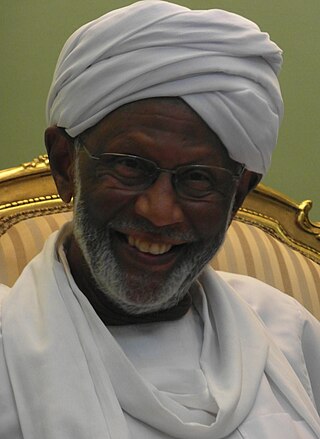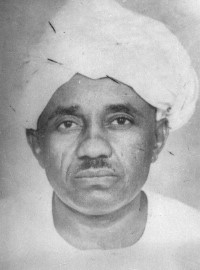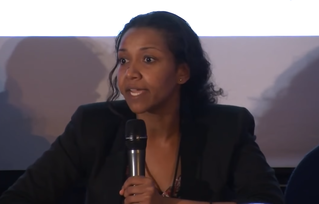Related Research Articles

The Society of the Muslim Brothers, better known as the Muslim Brotherhood is a transnational Sunni Islamist organization founded in Egypt by Islamic scholar and schoolteacher Hassan al-Banna in 1928. Al-Banna's teachings spread far beyond Egypt, influencing today various Islamist movements from charitable organizations to political parties.
The 2019 transitional constitution of Sudan guarantees freedom of religion and omits reference to sharia as a source of law, unlike the 2005 constitution of Sudan's deposed president Omar al-Bashir whose government had criminalized apostasy and blasphemy against Islam. Bashir's government had also targeted Shia Muslims and those engaging in proselytization to faiths other than Islam. Christians had also faced restrictions in matters of religious freedom.

Hassan al-Turabi was a Sudanese politician and scholar. He was the alleged architect of the 1989 Sudanese military coup that overthrew Sadiq al-Mahdi and installed Omar al-Bashir as president. He has been called "one of the most influential figures in modern Sudanese politics" and a "longtime hard-line ideological leader". He was instrumental in institutionalizing Sharia in the northern part of the country and was frequently imprisoned in Sudan, but these "periods of detention" were "interspersed with periods of high political office".
The National Islamic Front was an Islamist political organization founded in 1976 and led by Dr. Hassan al-Turabi that influenced the Sudanese government starting in 1979, and dominated it from 1989 to the late 1990s. It was one of only two Islamic revival movements to secure political power in the 20th century.
Abdullahi Ahmed An-Na'im is a Sudanese-born Islamic scholar who lives in the United States and teaches at Emory University. He is the Charles Howard Candler Professor of Law at Emory University School of Law, associated professor in the Emory College of Arts and Sciences, and Senior Fellow of the Center for the Study of Law and Religion of Emory University.

The dominant religion in Sudan is Islam practiced by around 90.7% of the nation's population. Christianity is the largest minority faith in country accounting for around 5.4% of the population. A substantial population of the adherents of traditional faiths is also present.
The Washington Theological Consortium is an ecumenical organization of Christian theological schools and interfaith partners located in Washington, DC, Virginia, Maryland, and Pennsylvania. Members cooperate to deepen ecumenical unity in theological education and to broaden interfaith dialogue and understanding and to prepare both clergy and laity with skills they need to minister in a diverse church and society. The Consortium is one of the most diverse of its kind in the nation, as it includes Roman and Byzantine Catholic traditions, mainline Protestants, Evangelicals, and Historic Black Divinity schools; with partners in spiritual formation, Jewish, and Islamic education.
Republican Brotherhood was a small, but influential political party in Sudan. The party was founded in the 1945, by Mahmoud Mohamed Taha. The party came into the limelight in 1983, as Taha opposed the implementations of sharia laws by Jaafar Nimeiry. Taha was arrested and executed in 1985. The party continued to exist for a few years, being disbanded sometime after 1989.

Mahmoud Mohammed Taha, also known as Ustaz Mahmoud Mohammed Taha, was a Sudanese religious thinker, leader, and trained engineer. He developed what he called the "Second Message of Islam", which postulated that the verses of the Qur'an revealed in Medina were appropriate in their time as the basis of Islamic law, (Sharia), but that the verses revealed in Mecca represented the ideal and universal religion, which would be revived when humanity had reached a stage of development capable of implementing them, ushering in a renewed era of Islam based on the principles of freedom and equality. He was executed for apostasy for his religious preaching at the age of 76 by the regime of Gaafar Nimeiry.

Ali Muhammad al-Sallabi, or al-Salabi is a Muslim historian, religious scholar and Islamist politician from Libya. He was arrested by the Gaddafi regime, then left Libya and studied Islam in Saudi Arabia and Sudan during the 1990s. He then studied in Qatar under Yusuf al-Qaradawi and returned to Libya during the 2011 overthrow of Gaddafi and distributed weapons, money, and aid to Islamist groups in the country. His actions were criticized by members of the internationally recognized Libyan government under the National Transitional Council who he in turn criticized as being secular.
The Socialist Republican Party was a political party in Sudan, founded in 1951. Ibrahim Bedri was the general secretary of the party. The party was floated ahead of the 1953 Sudanese legislative election. The party mobilized a section of tribal chiefs and sheikhs. However, the development of the Socialist Republican Party never took off, and the party lacked financial resources, organizational structures and a coherent programme.

Sudan is a developing nation that faces many challenges in regard to gender inequality. Freedom House gave Sudan the lowest possible ranking among repressive regimes during 2012. South Sudan received a slightly higher rating but it was also rated as "not free". In the 2013 report of 2012 data, Sudan ranks 171st out of 186 countries on the Human Development Index (HDI). Sudan also is one of very few countries that are not a signatory on the Convention on the Elimination of All Forms of Discrimination Against Women (CEDAW).
Mahmoud M. Ayoub was a Lebanese Islamic scholar and professor of religious and inter-faith studies.
Su'ad al-Fatih Mohammed al-Badawi was a Sudanese academic, politician, and journalist. She was known both for her advocacy of women's rights and for her support of Islamism.
Following the embargo by Arab oil exporters during the Israeli-Arab October 1973 War and the vast increase in petroleum export revenue that followed, the international propagation of Salafism and Wahhabism within Sunni Islam favored by the conservative oil-exporting Kingdom of Saudi Arabia and other Gulf monarchies achieved a "preeminent position of strength in the global expression of Islam." The Saudi interpretation of Islam not only includes Salafiyya but also Islamist/revivalist Islam, and a "hybrid" of the two interpretations.

Nahla Mahmoud is a Sudanese-born British writer, ex-Muslim, secularist, environmentalist, and human rights activist, and spokesperson for the Council of Ex-Muslims of Britain. She's known for being vocal against religious extremism; advocating free-speech, LGBT rights, and awareness on climate change. She fled to the United Kingdom in 2010.
The Islamist movement in Sudan started in universities and high schools as early as the 1940s under the influence of the Egyptian Muslim Brotherhood. The Islamic Liberation Movement, a precursor of the Sudanese Muslim Brotherhood, began in 1949. Hassan Al-Turabi then took control of it under the name of the Sudanese Muslim Brotherhood. In 1964, he became secretary-general of the Islamic Charter Front (ICF), an activist movement that served as the political arm of the Muslim Brotherhood. Other Islamist groups in Sudan included the Front of the Islamic Pact and the Party of the Islamic Bloc.
Omar Ahmed Al-Qarai, best known as Omer al-Qarray, is a Sudanese journalist and was the director of the Curriculum Center who resigned after being at the centre of controversy because of the new Sudanese curriculum.

Muhammad al-Mahdi al-Majdhub, also spelled al-Maghut or al-Majzoub, was a renowned Sudanese poet. He is widely recognised as one of the pioneers in Sudanese poetry and is credited with being one of the first poets of Sudanese Arabic poetry and "Sudanism". His contributions to Sudanese literature have left a lasting impact on the poetic landscape of the country.

In September 1983, Sudanese president Gaafar Nimeiry introduced Islamic sharia laws in Sudan, known as September Laws, disposing of alcohol and implementing hudud punishments such as public flogging for alcohol consumption and amputations for theft. Nimeiry declared himself the imam of the "Sudanese umma", leading to concerns about the undemocratic implementation of these laws. Hassan al-Turabi assisted with drafting the law and later supported the laws, unlike, the leader of the opposition, Sadiq al-Mahdi's dissenting view.
References
- 1 2 "MDIA Professor Steve Howard Publishes "Modern Muslims" | Ohio University School of Media Arts & Studies". mediaschool.ohio.edu. Retrieved 2018-12-04.
- 1 2 3 4 5 6 "Steve Howard | Ohio University School of Media Arts & Studies". mediaschool.ohio.edu. Retrieved 2018-12-04.
- 1 2 3 4 5 6 7 8 9 Howard, W. Stephen (26 October 2016). Modern Muslims : a Sudan memoir. Athens. ISBN 9780821445778. OCLC 956954169.
{{cite book}}: CS1 maint: location missing publisher (link) - ↑ "Republican Brotherhood | Encyclopedia.com". www.encyclopedia.com. Retrieved 2018-12-04.
- ↑ "Remembering A Radical Reformer: The Legacy Of Mahmud Muhammad Taha". MEMRI. Retrieved 2018-12-04.
- ↑ "Sudan's Republican Party to demonstrate in memory of its hanged leader - Sudan Tribune: Plural news and views on Sudan". www.sudantribune.com. 27 June 2016. Retrieved 2018-12-04.
- ↑ "News Archive | Ohio University". www.ohio.edu.
- ↑ "Steve Howard | Ohio University School of Media Arts & Studies". mediaschool.ohio.edu.
- 1 2 3 4 5 6 7 Howard, Steve. Resume [2018].
- ↑ "MDIA Professor Steve Howard Serves as Fulbright Lecturer in Sudan | Ohio University School of Media Arts & Studies". mediaschool.ohio.edu. Retrieved 2018-12-04.
- ↑ "OU professor to be honored as 'African hero'". The Post. Retrieved 2018-12-04.
- ↑ Aix (2022-10-04). "ASA 2022 Prize Finalists and Awardees". African Studies Association Portal - ASA - ASA. Retrieved 2022-10-04.